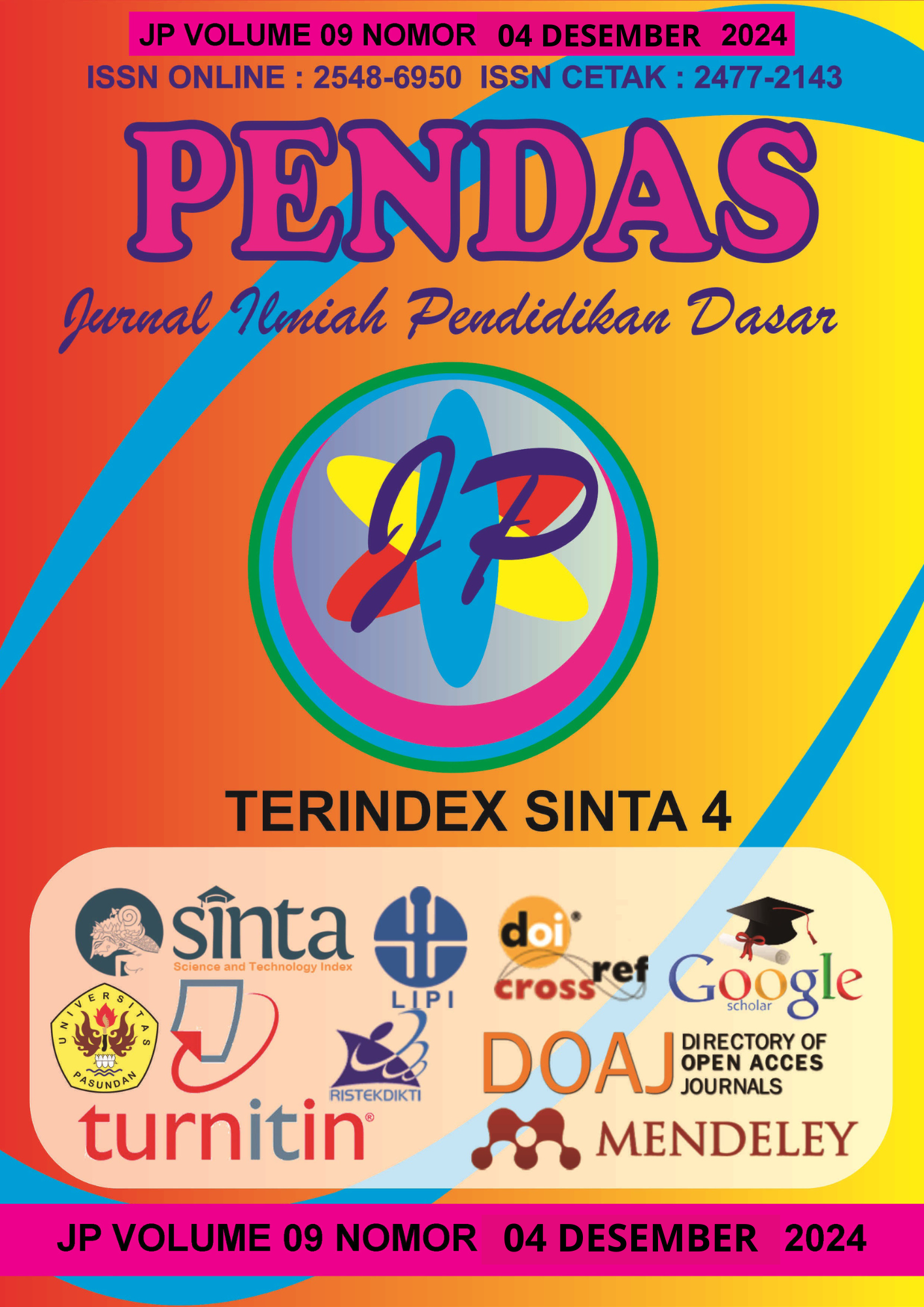IMPLEMENTASI PLATFORM KHAN ACADEMY PADA PEMBELAJARAN MATEMATIKA DENGAN PENDEKATAN HYBRID DI SEKOLAH INDONESIA KUALA LUMPUR (SIKL)
DOI:
https://doi.org/10.23969/jp.v9i04.22072Keywords:
Khan Academy, , Mathematics, Hybrid Learning, Sekolah Indonesia Kuala LumpurAbstract
Mathematics is an important foundation in human intellectual development and daily life, yet many students struggle to understand its abstract concepts. This study aims to explore the effectiveness of Khan Academy-based hybrid learning in improving students’ understanding and engagement in SIKL. The research subjects were 9 students in grades 3-5 (aged 9-14 years). The method used was mixed, with quantitative data through pre-test and post-test on basic mathematical concepts on Geometry and fraction, analyzed using paired t test, as well as qualitative data from questionnaires and content analysis. The study was conducted over 28 days with a hybrid approach combining online learning with Khan Academy and offline guiding by tutor assistance. Statistical analysis using the paired t test showed a significant increase between pre-test and post-test scores (p = 0.0074), with an average difference of 17.33. This finding indicates an increase in students' understanding of basic math concepts. Qualitative analysis showed that 88.89% of students found hybrid learning interesting, 77.78% found the material easier to understand, and 33.33% appreciated the combination of online and offline learning. However, students also suggested improvements in video quality (44.44%) and learning duration (33.33%) This study concluded that the Khan Academy-based hybrid approach is effective in improving students' mathematical understanding. However, the success of this approach still requires the role of tutors in explaining concepts that are difficult to understand.With improvements in video quality and lesson duration settings, this approach has the potential to be applied more widely.
Downloads
References
Cargile, Lori A., and Shelly Sheats Harkness. 2015. “Flip or Flop : Khan Academy as Envisioned by Sal Khan ?” TechTrends 59.
Creswell, john w. 2012. Reaserch Design Qualitative,Quantitative, and Mixed Methods Approaches.
Fazita, Neira, Davi Apriandi, and Endang Sri Mumpuni. 2023. “Upaya Penerapan Model Pembelajaran Problem Based Learning Terhadap Peningkatan Hasil Belajar Pada Materi Fpb Di Kelas Iv Sdn 178 Gegerkalong Kpad.” Pendas : Jurnal Ilmiah Pendidikan Dasar 8(1):2831–44. doi: 10.23969/jp.v8i1.8038.
Field, Andy. 2018. Discovering Statistics Using IBM SPSS. 5th ed. Sage Edge Publication Ltd.
Ghanie, Shafeak. 2020. “The Effectiveness of Khan Academy Videos in Teaching Mathematics at the First-Year Level of University.” 10(5):47. doi: 10.9790/7388-1005033948.
Guler, Mustafa. 2016. “A Research on Future Mathematics Teachers ’ Instructional Explanations : The Case of Algebra.” Educational Research and Reviews (August). doi: 10.5897/ERR2016.2823.
Hidayat, Muhammad. 2021. “Analisis Perbandingan Kinerja Keuangan Dan Nilai Perusahaan Sebelum Dan Disaat Pandemi Covid 19.” Measurement Jurnal Akuntansi 15(1):9–17. doi: 10.33373/mja.v15i1.3332.
Irma, Ayuwanti. 2024. “Matematika Sebagai Bahasa Universal.” Unu Lampung.
Kelly, Sandra Lee. 2018. THE IMPACT OF KHAN ACADEMY MATH REMEDIATION ON NINTH GRADE STUDENT ACHIEVEMENT. Liberty University, Lynchburg, VA: ProQuest LLC.
Mcmillan, James, and Sally Schumacher. 2014. Research in Education Evidence-Based Inquiry 7/E. Pearson Education Limited.
Murphy, R., L. Gallagher, A. .. Krumm, J. Mislevy, and A. Hater. 2014. “Research on the Use of Khan Academy in Schools.” (March).
Nguyen, Thanh Chi, and Cuong Tuan Le. 2020. “A Case Study by Using Khan Academy, an Open-Source Environment.” Vietnam Journal of Education 4(4):22–27. doi: 10.52296/vje.2020.76.
Nurhikmayati, Iik. 2017. “Kesulitan Berpikir Abstrak Matematika Siswa Dalam Pembelajaran Problem Posing Berkelompok.” Kalamatika: Jurnal Pendidikan Matematika 2(2):160–61. doi: 10.22236/kalamatika.vol2no2.2017pp159-176.
Soebagyo, Joko. 2016. “PEMANFAATAN WEB KHAN ACADEMY DALAM PEMBELAJARAN MATEMATIKA.” Jurnal Ilmiah Program Studi Matematika STKIP SIliwangi Bandung 5(1):50–55.
Song, Chuanxiang, Seong Yoon Shin, and Kwang Seong Shin. 2024. “Implementing the Dynamic Feedback-Driven Learning Optimization Framework: A Machine Learning Approach to Personalize Educational Pathways.” Applied Sciences (Switzerland) 14(2). doi: 10.3390/app14020916.
Sugiyono. 2020. Metodologi Penelitian Kuantitatif, Kualitatif Dan R & D.
Tampubolon, Juliana, Nurdini Atiqah, and Unedo Immanuel Panjaitan. 2019. “Pentingnya Konsep Dasar Matematika Pada Kehidupan Sehari-Hari Dalam Masyarakat.” Program Studi Matematika Universitas Negeri Medan 2(3):1–10.
Widyastuti, Riski Tri, and Gamaliel Septian Airlanda. 2021. “Efektivitas Model Problem Bsed Learning Terhadap Kemampuan Pemecahan Masalah Matematika Siswa Sekolah Dsar.” Jurnal BASICEDU 5(3):1120–29.
Yunarti, Susi, Wijayanti Wijayanti, and Dian Harmaningsih. 2022. “Model Blended Learning & Hybrid Learning Untuk Keberhasilan Transformasi Digital Menuju Smart Society.” IKRA-ITH HUMANIORA : Jurnal Sosial Dan Humaniora 6(3):76–86. doi: 10.37817/ikraith-humaniora.v6i3.2186.
Downloads
Published
Issue
Section
License
Copyright (c) 2025 Pendas : Jurnal Ilmiah Pendidikan Dasar

This work is licensed under a Creative Commons Attribution 4.0 International License.














































